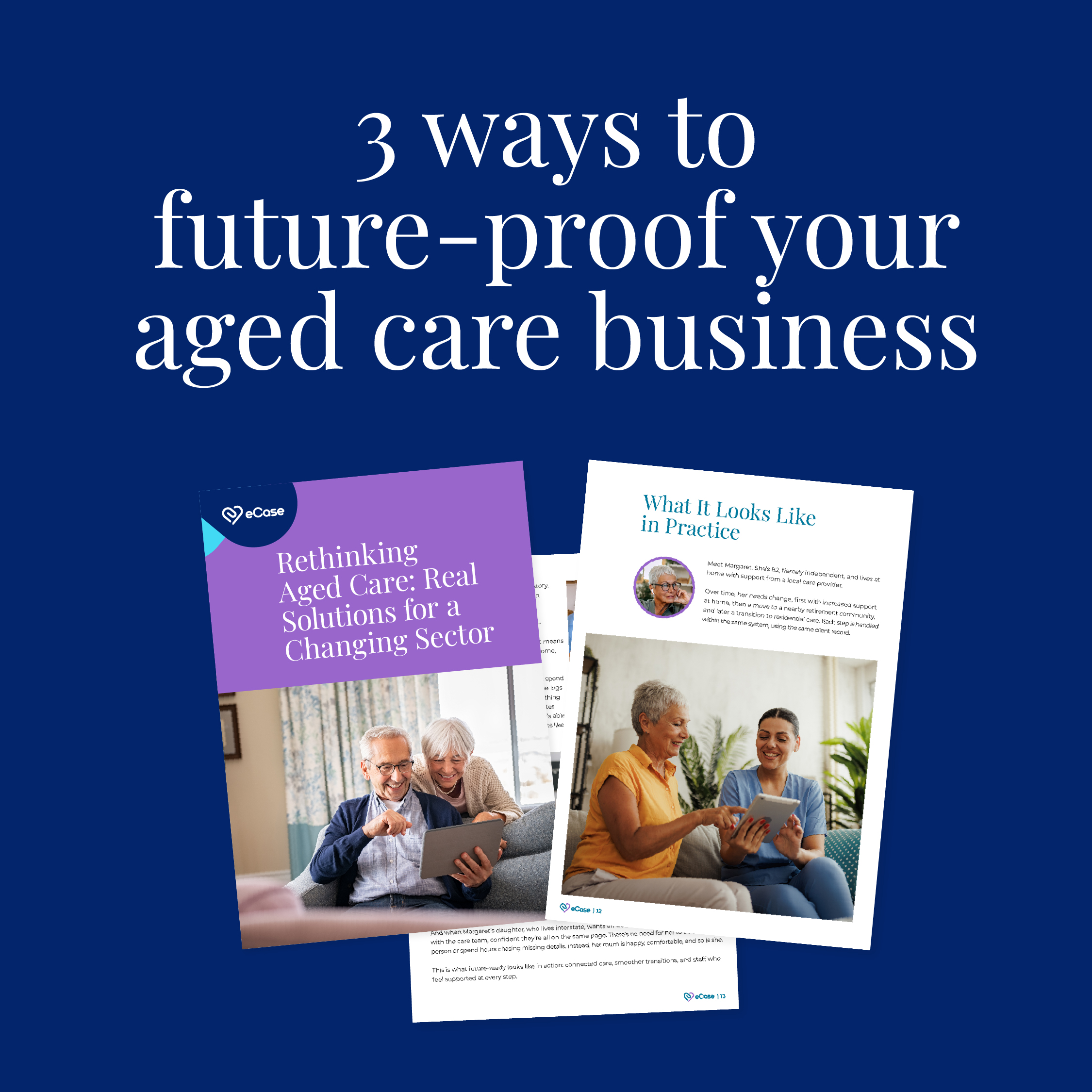Expectations for better client experiences are increasing in every sector – and aged care is no exception. Modern older Australians are moving into aged care settings at varying stages in their lives and have greater choice than ever between models of care that suit their specific wants and needs.
Older Australians want continuity regardless of their care needs, not just in the clinical sense, but emotionally, socially, and technologically too. They want care that feels personalised and consistent, and for that care to enable their independence. For providers, that means delivering seamless care in a system where needs are constantly changing.
The answer lies in access to a single client record – a unified source of truth that connects every stage, setting, and service in a client’s care journey.
What is a Single Client Record?
A single client record is exactly what it sounds like: one digital profile that captures a client’s information across all touchpoints and interactions. This includes clinical data, care plans, medication logs, service history, and communication preferences, kept current, all in one place, and updated in real time.
When care records are centralised and up to date, care becomes more consistent, regardless of where it’s delivered. All carers have oversight of the care plan, enabling them to provide holistic and complimentary care. It also means if a carer is on leave, a temporary carer can step in with easy access to the full picture.
And when the time comes for someone to move between models of care, their record moves with them, making their transition that much smoother. There’s no need to repeat information, nothing gets lost, creating a more human experience. Care providers also benefit – the ability to provide a consistent experience means they become a provider of choice for the next stage of care.
Why It Matters More Than Ever
Older Australians and their families want to feel seen, heard, and understood across every encounter, and most of all, feel in control of their own journeys. A single client record helps deliver this; it also helps solve some of the sector’s other challenges, such as:
- Complex care coordination: As comorbidities rise and care needs span more disciplines, providers need better visibility across services to avoid duplication, omissions and risk.
- Workforce pressure: With staff shortages and high turnover, providers can’t rely on individual knowledge. A central record ensures information stays with the person seeking care, not the carer.
- Compliance and reporting: A single, auditable source of truth makes it easier to demonstrate compliance and track outcomes across the board.
- Family expectations: Clients and their families want reassurance that everyone is on the same page. Shared access and transparency build trust and satisfaction.
The Impact Across the Continuum of Care
A single client record isn’t just beneficial for care teams. It has ripple effects across the entire aged care ecosystem. For those seeking care, they’ll experience more personalised, coordinated care – no matter the setting. They don’t have to repeat their story, and their preferences are respected throughout. Families gain confidence knowing their loved one’s care is consistent and well-documented. This reduces anxiety and improves communication. And for providers, it means fewer gaps, safer handovers, and better outcomes, not just clinically, but operationally and reputationally.
Enabling the Shift to Future-Ready Aged Care
The move towards a single client record is more than a tech upgrade, it’s a step towards future-proofing aged care. As tools like predictive analytics, AI, and real-time reporting become more common, they rely on accurate, centralised data to deliver value. With a single record in place, providers can unlock insights that improve decision-making, optimise resource allocation, and support proactive care. It also makes integrating with other systems, like medication management, pain monitoring, or feedback tools, much easier.
What to Look for in a Technology Partner
Not all solutions are created equal. To fully realise the benefits of a single client record, providers need a platform that:
- Supports the full continuum of care, from retirement living to home and residential care
- Integrates with other tools and services across clinical, operational, and lifestyle domains
- Offers real-time access to information at the point of care
- Provides intuitive, role-based views for carers, administrators, and families
- Is co-designed with providers to reflect the real needs of the sector
eCase was designed in Australia, for Australian providers, and in close collaboration with them too. It reflects the realities of the aged care workforce and the complexity of client journeys, offering a single, connected view of care across all settings.
The aged care sector doesn’t need more systems, it needs smarter ones. A single client record is the foundation for safer, more personalised, and more efficient care.
For providers ready to embrace it, the opportunity is clear: better outcomes for clients, greater confidence for staff, and stronger positioning for the future.









